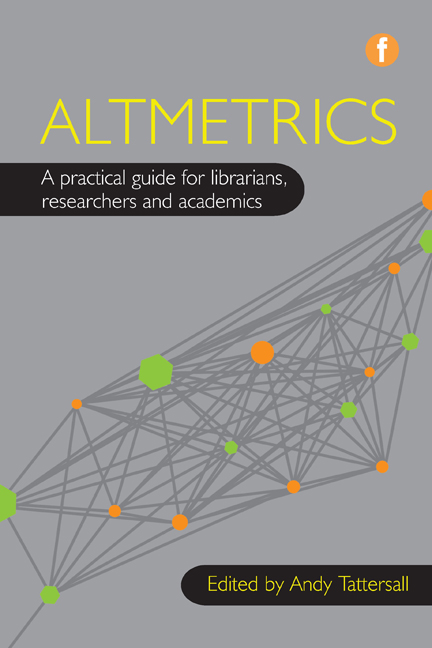Book contents
- Frontmatter
- Contents
- Contributors
- 1 Introduction
- 2 Road map: from Web 2.0 to altmetrics
- 3 ‘Metrics of the trade’: where have we come from?
- 4 The evolution of library metrics
- 5 The rise of altmetrics
- 6 Beyond bibliometrics: altmetrics reflects information about engagement with more types of scholarly content from more types of consumers
- 7 Considerations for implementing new technologies
- 8 Resources and tools
- 9 The connected academic: implementing altmetrics within your organization
- 10 Appmetrics: improving impact on the go
- 11 Open peer review
- 12 Conclusion
- Index
3 - ‘Metrics of the trade’: where have we come from?
Published online by Cambridge University Press: 08 June 2018
- Frontmatter
- Contents
- Contributors
- 1 Introduction
- 2 Road map: from Web 2.0 to altmetrics
- 3 ‘Metrics of the trade’: where have we come from?
- 4 The evolution of library metrics
- 5 The rise of altmetrics
- 6 Beyond bibliometrics: altmetrics reflects information about engagement with more types of scholarly content from more types of consumers
- 7 Considerations for implementing new technologies
- 8 Resources and tools
- 9 The connected academic: implementing altmetrics within your organization
- 10 Appmetrics: improving impact on the go
- 11 Open peer review
- 12 Conclusion
- Index
Summary
Introduction
Paradoxically, with altmetrics in the ascendancy, the scholarly world is witnessing a renaissance of interest in traditional metrics. This chapter examines long-standing and recent drivers for metrics from the complementary perspectives of scientists, research organizations and funding agencies. It outlines established metrics for individuals (e.g. citations and the h index) and for teams and journals (the journal impact factor and other proprietorial alternatives). It examines the extent to which these metrics correlate to other important characteristics such as newsworthiness and journal prestige. The h index is an author-level metric which scores academics by their most cited papers. For example, if an academic has ten papers that are each cited ten times, their h index is 10. If they have ten papers cited no more than once each, their h index is 1.
The chapter considers challenges raised by the emerging ‘impact agenda’, including a need to capture ‘impact on society, social impact, real-world impact, knowledge translation, and uptake by the public’ (Eysenbach, 2011). It also describes how both traditional and impact metrics have been used in a variety of research and performance management contexts, giving examples of appropriate and inappropriate use.
The chapter examines criticisms of established measures and how these criticisms might, at least in theory, be addressed. It discusses manipulation and game playing which exploit acknowledged weaknesses of metrics, and provides high-profile examples. It examines the extent to which relatively recent forms of publishing, such as open access journals, are accommodated by, or pose challenges to, traditional metrics.
The chapter sets the scene for the considered evaluation of altmetrics that follows in subsequent chapters. It concludes by examining whether traditional metrics still occupy a role within a world that is increasingly populated by social media and social networks.
On metrics and madness
In Prokofiev's Lieutenant Kijé, a slip of a clerk's pen on a list of officers for promotion compiled for a mad tsar leads to the creation of the fictitious hero. Fearful of displeasing the mad tsar, his advisers manufacture increasingly elaborate escapades for the imaginary Kijé, each one rewarded by a successive promotion.
- Type
- Chapter
- Information
- AltmetricsA practical guide for librarians, researchers and academics, pp. 21 - 48Publisher: FacetPrint publication year: 2016
- 1
- Cited by



